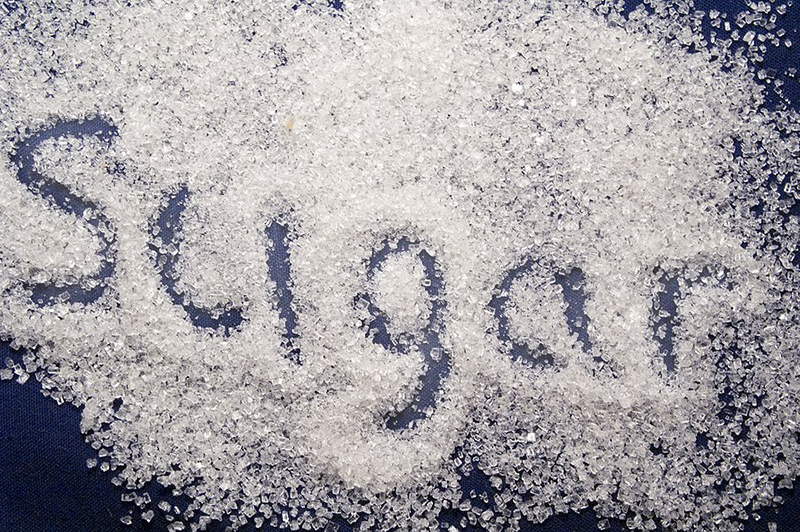
Most of us are aware that sugar is not the best choice for a food source. However, in polling my patients I found that most really didn’t understand why other than it inevitably leads to weight gain. Gaining weight however is just one of the many consequences of sugar’s negative effect on our bodies. In reality sugar directly or indirectly affects all the major systems of our bodies. While researching for this paper, I discovered that Americans consume around 156 lbs. of added sugar a year, which is the equivalent of 30- 5pound, bags per person per year! That does not include the naturally occurring sugars we consume such as those found in fruits, grains and vegetables. So, where does it all come from? Of the 156 pounds, 29 of them are from the sugar you scoop into your coffee or use while baking. The rest comes from food you generally wouldn’t think contains sugar such as ketchup, peanut butter, salad dressings, crackers, yogurt, dips, and energy bars. I encourage you to read labels and I think you will be surprised at the number of foods you consume that have sugar as a main ingredient. The guidelines for sugar consumption as set forth by the WHO (World Health Organization) suggest that no more than 10% of your daily calories should come from sugar. To put this in perspective, if you drank one single can of soda that would put you over the limit!
Most of us like sugar in some form or another, but to really understand the complication of sugar we have to “look under the hood” so to speak. Sugar effects two significant hormones in your body, insulin and glucagon. These two are intricately related to controlling your metabolism and they do the exact opposite of one another. Insulin lowers blood sugar, converts fat to storage, increases production of cholesterol, removes fat from blood and takes it to fat cells and shifts the body into storage mode, makes the kidneys retain fluid and stimulates growth of arterial smooth muscle cells. Glucagon, on the other hand, raises blood sugar, coverts fat into ketones and sends it to the cells to be burned, releases fat from cells to be burned as energy, decreases the production of cholesterol, makes the kidneys release fluid, shifts metabolism into burning mode and stimulates the regression of arterial smooth muscle. So, why is this important to you? When you eat too much sugar for your body, it upsets the balance leading to increased cholesterol, increased blood pressure, weight gain in your mid-section, fatigue, decrease in your muscles’ ability to use glucose, bloating and unfortunately hunger!
We Americans love consuming large amounts of carbohydrates. When these carbohydrates break down in our bodies, they convert to sugar. Increased levels of sugar over time can and most often does lead to insulin resistance. In fact, the research shows that most people over the age of thirty who are not eating mindfully are dealing with some degree of insulin resistance. When talking to patients about their insulin resistance, I find there is such relief that they are not diabetic that they fail to fully understand the consequences of insulin resistance. Insulin resistance is a condition in which cells fail to respond to the normal action of insulin. Cells are not able to take in glucose, amino acids and fatty acids as well as decreased growth hormone leads to all the aforementioned symptoms.
Unfortunately, there is no drug that changes the resistance of the body cells to insulin. There is, however, something that we can do about it.
EXERCISE
Most important because it causes the release of growth hormone. Growth hormone will reduce the liver’s uptake of glucose, so we don’t store as much, stimulate the immune system, increase fat breakdown, so we burn fat more efficiently, increase our muscle mass, increase the strength of our bones and stimulate the health and growth of all organs except the brain. There are a few guidelines that really make exercise productive and cause the release of growth hormone.
Important guidelines:
- Exercise on an empty stomach
- Exercise intensely to the point of muscle fatigue such as cycling, weight lifting, interval classes
- Do not eat for one hour following exercise and only drink water during exercise
- Consume only protein and no carbs near workout time
REST
The biggest surge of growth hormone occurs one hour after you get in a deep sleep, BUT you cannot have had sweets or carbs before bedtime. This will inhibit the release of the growth hormone.
GREEN TEA
Drinking green tea before you eat reduces the glycemic index of food uptake.
So, the good news is there are some things we can do about the effects of sugar and reduce the insulin resistance. The bad news for some is that it means that we have to exercises and rest well. Please evaluate your sugar intake. Think about what it is doing “under the hood”. If you need to use sugar consider a sugar substitute such as stevia. Its steriol glycoside has 300 times the sweetness of sugar and a neglible effect on blood glucose levels. Even though your symptoms may not be immediately evident, sugar will eventually take its toll.

 We are getting closer to that time of year again when ragweed and other pesky irritants water our eyes, clog our noses and make our lungs expel. Fall is just around the corner and with a few helpful hints you just may be able to reduce your symptoms.
We are getting closer to that time of year again when ragweed and other pesky irritants water our eyes, clog our noses and make our lungs expel. Fall is just around the corner and with a few helpful hints you just may be able to reduce your symptoms.